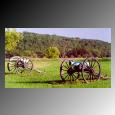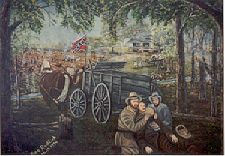
|

WOOLSEY HISTORY IN THE "FIRST PERSON"
Civil War Wife and Mother (written by Katie Woolsey, 6th grade)
My name is Elizabeth Jane Burklow. I was born in Kentucky in the year 1824. My family moved from Kentucky to the new state of Illinois, once a part of the Northwest Territory. My father moved to Illinois in search of better lands for farming. Unlike the hilly land of Kentucky, Illinois was flat.
While we were living in Illinois, I met a man that I fell in love with and married on April 15, 1845. His name was Jehu Moses Woolsey. Because Jehu's first wife died, we already had four children when we were wed. The children of Jehu's first wife were named Cynthia, Solomon, Charles and Harriet. Although Jehu and I were married in Perry County, Illinois, we settled in Williamson County, Illinois. We owned a valuable farm that was worth four hundred dollars in 1850.
Since my husband and I were from Kentucky, we were both sympathetic to the South. Because we were supporters of the South, we had a problem living in Illinois. Illinois was a northern state that opposed slavery. We had a senator from our state named Abraham Lincoln who was running for president. He was campaigning to stop the spread of slavery. It seemed as though the whole nation was breaking apart. It looked like we were getting ready to go to war.
Because of our problems in Illinois, Jehu and I decided to sell our farm and move farther south. My husband's family in Illinois had relatives living in Missouri. Since property could either be homesteaded or bought cheap in Missouri, land was very available. In 1860 our family moved from Illinois to Delaware Township, Shannon County, Missouri. We settled on a ridge between two small streams called Leatherwood and Rough Creek. The streams emptied into Jacksfork of the Current River. The closest town was called Oakside. Farther south of us, in that same year, a small community was starting called Mountain View.
The year we moved, Lincoln was elected President of the United States. After the election, some of the southern states started to secede from the Union. The war began in April of 1861 when South Carolina fired on the federal soldiers at Fort Sumter. On July 21, 1861, the first battle of Bull Run was fought. Less than a month later on August 10, 1861, my son, Solomon, was severely wounded at the Battle of Oak Hills. The Yankees called it the Battle of Wilson Creek. Solomon was fighting under the command of the Confederate General James H. McBride. My son was so badly wounded that the battlefield doctors recorded him as being killed. He was shot in the groin and in the arm. Solomon was taken to a hospital at Springfield where he started to recover. We brought Solomon home about a month later on September 14. Solomon stayed with us for a year to recover. We laid him across wooden chairs so his wounds could drain. While he was recovering at home, we watched him make a little pair of deerskin shoes for Martha, his new baby sister. After his wounds healed, he reenlisted on August 4, 1862, under the Confederate command of Colonel W. O. Coleman. Eight months later, after the Yankee siege at Fort Smith, Arkansas, my son was dead.
Towards the end of the war, my husband, Jehu, died. I was pregnant at that time. Because Solomon was dead and my other son, Charles, was away from home fighting in the war, I was left on the farm with four small children. Since I was all alone, I decided to move my family farther south into Arkansas where it was safe. My last child, Sterling, was born there in 1865. While we were in Arkansas the war ended.
My son, Charles, had fought under the Confederate command of Brigadier General M. Jeff Thompson. General Thompson and his men were stationed in the boot heel of Missouri. When the war ended General Thompson and his soldiers surrendered at Jacksonport, Arkansas. It was there that my son, Charles, was taken prisoner of war by the North. Prisons were not the best place to be during the Civil War. About 194,000 Union soldiers and 214,000 Confederate soldiers were held prisoner during the conflict. The conditions in prisons were terrible. Camps were overcrowded, and guards could not provide proper care. This is why most people died of disease in prison. After being released, Charles returned to Missouri.
It wasn't long after the war ended that we got word that President Lincoln, our old Senator from Illinios, had been assassinated by a man named John Wilkes Booth. That awful war had destroyed so many people. After the war had ended, I moved back to Shannon county, Missouri. I decided not to go back to our old homeplace. Instead I settled close to the small community called Big Creek in Spring Valley Township. I bought a farm on December 30, 1867, from Wilson Farrow for two hundred dollars. My farm was close to Summersville, Missouri. I lived there for the rest of my life.
Katie Woolsey
Note:
Elizabeth's stepson, Charles, was the great-great-great grandfather of Katie Woolsey. I picked Elizabeth Jane Burklow Woolsey because she was a very courageous and determined woman. She gave up her husband and one son to the war. Women had a big part to play in the Civil War. While the men were off fighting, the women were at home taking care of the family and the farm. Some even dressed up like men and joined the war.
|
|
The Battle of Oak Hills - C.S.A. (Battle of Wilson Creek - U.S.A.)
|
 |
Poem written by Edwin Woolsey
Those days in August of '61
Lay heavy and hot over the blue hazed hills.
All nature in mute silence watched,
As our columns flooded her valleys, hushed and still.
The path I walked down on this day
Was one like I had never known.
Although the same world frozen about me stood
Yet a much stranger one it seemed than from which I had grown.
Gone were the young days, the fun days of being at home.
Gone were the times of working with Pa and doing my chores.
Gone were the days of games and races with my brothers.
Oddly, today I found myself going to war!
Here I walked with so many others,
Crowded together and yet each one alone,
Ever marching onward to an unknown ending,
Knowing only that this road was moving farther from home.
But up ahead I caught sight of familiar faces.
Pa and Charles were going this way too.
Leaving Ma and the kids behind, we had thrown our lots in together.
Pa had said, "The three of us are goin' to see this one through."
The afternoon of the sixth was hotter than most.
The air from the road seemed to wrinkle in the light.
We stopped early that day by the banks of a river
To prepare for what was to be a soon coming fight.
Now Major General Price and us Missouri boys
Were finished and ready to reclaim our state,
But old General McCulloch, who was leading us all,
For reports on Yankee positions was determined to wait.
So we camped on that little creek for two whole days,
Which was pretty nice because we needed the rest.
Yet we knew in our minds that a battle was building,
But the way it would happen not a one of us guessed.
Well, finally on the eighth came the word that Price wanted,
"General Lyon was in Springfield but soon might withdraw."
Price urged McCulloch to move now on that city,
But McCulloch, himself, rode to the front to record what he saw.
It wasn't until the ninth that the orders were given,
To "Break camp at 9:00 and march on Springfield by night."
The camps exploded with noise as we got our gear ready.
"Blood Fever" was in the air as we prepared for the fight.
Gray clouds hung low as the ninth hour drew closer.
As we were ready to march, a light rain started to fall.
We instead pitched our camps to protect our munitions.
One more night by the river we would spend awaiting our call.
Well, our call never came as morning first found us,
Now stirring ourselves from last night's restless bed.
On the big oak hill by the river we saw dawn come slipping
Up over our tents with great streamers of red.
From the clear sky that awoke us we were amazed to hear thunder
As it came rolling through the timber over the crest of the rise.
Up from his short breakfast our General McBride came a riding
To forewarn us of the danger we could read in his eyes.
"Boys! Get in your places, for the enemy is upon us!
Up this hill we must go to support Price and his men!"
McBride's words soon faded as we rallied and surged forward,
Lost to the sound of Sigel's guns and the noise of the din.
Up the hill we stepped smartly through the brush and oak timber,
Now half hidden in smoke from the line of assault.
Just up ahead hid Price and beyond him came Lyon.
To the left of Guibor's battery we came to a halt.
Then moving farther to the left to slip around Andrews,
We were hit square in the face with Totten's big guns.
Andrews turned with his rifles to check our advancement,
But we held on to the high ground never turning to run.
When we could not go to the left of Andrews or Lyon,
Then came the order from Price, "To the center revert!"
As I was rising to follow, my belly was shot in the middle.
I fell to the ground all bloody and hurt.
As I lay there half dead in a deep, misty darkness,
I could hear in the distance the sounds of the fray;
The rattle of muskets, the whine of shells flying,
The cries of the wounded, Fate picked to die on this day.
I was sure my life ended while lying there dying,
For the same noises around me no longer I heard.
I once again tasted home's cool, spring water.
My eyes saw Ma's face. I heard the singing of birds.
But voices above me brought me back to my senses,
"There's nothing we can do, Sir. Your son's almost gone."
I then felt those hands that held me as a baby,
"It's all over, Son. We'll take you back home."
There to my wonder knelt Pa and my brother,
Holding me in their arms to take me from here.
Gently they raised me to the bed of the wagon,
"We're goin' home, Son, where there's nothing to fear."
These scenes that came near me just moments before hand
Were not meant for my dying, I know now to be true.
For now as a family, the old wagon faced homeward.
We had taken the worst, and as a family came through.
Edwin Woolsey
|
 |
|
|
|
|
|
|
|
|
|
|
|
|